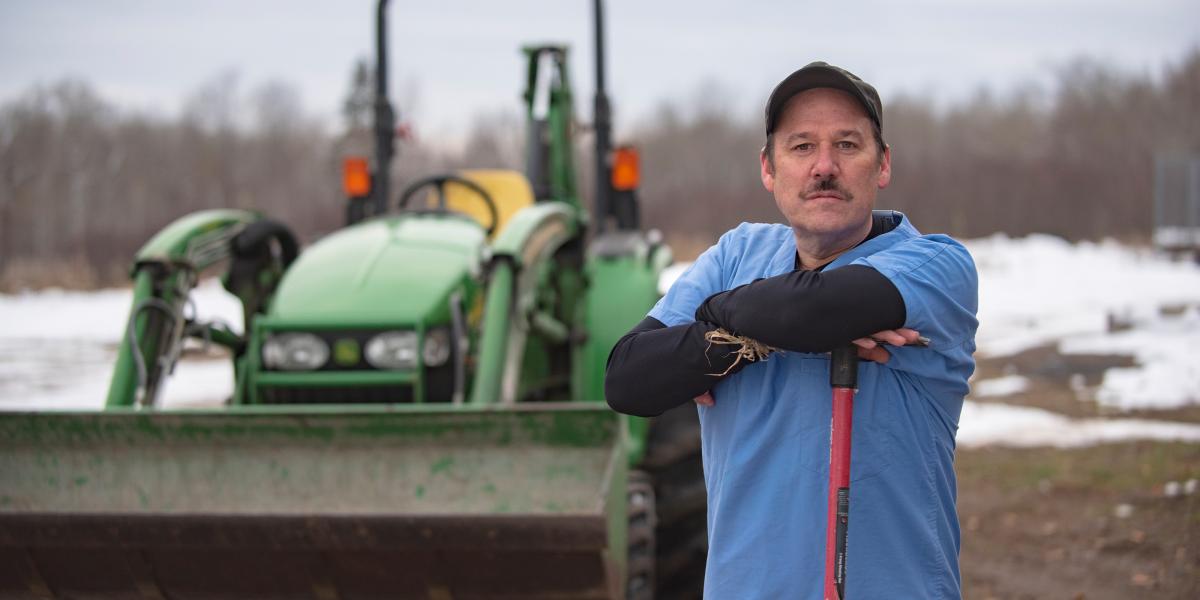The Long Haul
COVID-19 has left me and thousands of others with lingering symptoms and an uncertain recovery.
The potato sat on the ground near the hole I had just dug with the backhoe. It looked like how I felt: alone and sitting at the edge of a chasm that could swallow me up.
I got COVID in early March from my job as a home-care nurse. My spouse, Barb, is also a nurse, and cared for me at home. My symptoms included a loss of smell and taste, fever, severe shortness of breath, low blood-oxygen levels, rapid heart rate, dry cough, and later, the feeling of my lungs filling up, conjunctivitis, extreme sore throat, and severe weakness. I developed symptoms of pneumonia with back pain, but my chest X-ray was clear. A month later, a CT scan showed blood clots in both lungs. I was told I was lucky to be alive.
I had been healthy and athletic, running three miles a day. Now I struggled to climb onto the tractor, and then to recover my breath.
I use the tractor to maintain my hobby farm. Yesterday, my wife grabbed the potatoes from the ground as I shook them out with the backhoe, but today she was working at the full-time job she found to support us.
This recovery will not seem to end. The chest pain and severe shortness of breath with any movement are worsening again.
What I would not give to breathe normally again.
I looked at the potato and realized I cannot do this task alone. I am luckier than many who are dealing with recovery totally alone. Still, most friends and all coworkers have distanced themselves. Many evenings Barb has seen me gasp for breath. We discussed what would happen to the farm if I do die, and we have prepared for the worst. How would she manage without me?
The medical community has not been dealing well with “long-haulers” like me. This pandemic showed me just how broken our health care system is. I have many stories about how the system has failed me, but this story today is about my potato.
I had grown the potato meticulously. Shortly after my embolisms were treated, I was able to squat down and weed in the garden. Then the weakness progressed to the point that I was forced to sit. I pushed a piece of cardboard along the ground to sit on as I pulled weeds, but I could not see them through the tears. I remember thinking, “This is what I have been reduced to.”
What I would not give to breathe normally again.
I recently returned to my job as an RN for three partial days, but on that third day, I had difficulty breathing while providing care. Today I am off work again.
Looking down from the backhoe, I am starting to despise that potato.
The few potato hills left are hard to find in the weeds that have now taken over the garden. Blindly digging for potatoes has yielded some success. The blind digging for answers on why I am still sick has not—and it has been very costly with tests and three ER visits. There is no protocol for diagnosis, testing, and follow-up of long-haulers like me.
I was unable to get tested for COVID after showing symptoms—at first testing was not available, and then I was not approved for it. I was finally clinically diagnosed based on symptoms, related blood clots, and now a new B12 and D3 deficiency. Even so, some people say “COVID is a hoax.”
But I must focus.
Focus has eluded me as I’ve dealt with “COVID fog.” At one point I could not sort bolts and forgot how to swipe to answer my phone. Now the fog is finally beginning to clear. I’ve found support online, and I realize I’m not alone in this recovery struggle. I am grateful to be alive, and I feel immense sadness when I think of the people who have suffered and died.
COVID is not the flu. It does not just affect old people or those with underlying conditions. It does not care about politics.
Despite the tremor in my hand, I gently picked up the potato with the backhoe bucket but then sent it careening across the lawn.
The struggle continues, but I will eventually win.
